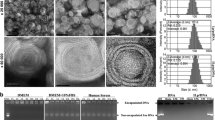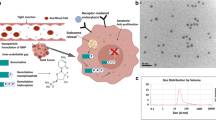Heading
Abstract
Background. Conventional chemotherapy of pancreatic carcinoma is only marginally effective. This is in part due to the severity of side effects following systemic administration of the cytostatic drug. The aim was to create a therapeutic tool allowing the targeting of the conversion site of a cytotoxic prodrug to the site of the tumor. This was realized by transfection of the CYP2B1 gene, the major ifosfamide-converting P450 enzyme, in cells with subsequent microencapsulation and administration of these microcapsules to or into the tumor. The enzyme activity (resorufin assay) remained stable for weeks in vitro and in vivo within the microencapsulated CYP2B1-expressing cells. We demonstrated a significant antitumor effect of the intratumorally injected capsules against xenotransplanted human pancreatic carcinomas in the nude mouse. Angiographic experiments in the pig confirmed the feasibility of an intraarterial placement of the capsules into the pancreas. A clinical protocol was established and approved.
Patients, material and methods. L293 cells were transfected with the CYP2B1 gene, microencapsulated (diameter 0.7 mm) under GCP conditions and packed sterile. Patients with confirmed inoperable adenocarcinoma of the pancreas underwent angiography, and capsules were injected into a vessel leading into the tumor. The patients were monitored for 48 h to exclude allergic reactions or pancreatitis. A day later, ifosfamide was administered for three consecutive days to be repeated on days 21–23. The patients were followed up for 5 months.
Results. A total of 17 patients were enrolled. The patients tolerated the procedure without any complications. No allergic reactions or pancreatitis were encountered. Chemotherapy was uneventful. All patients had stable disease, and two patients a partial remission. The median survival was 44 weeks which compared favorably with that of a historical control group (22 weeks).
Conclusions. The intraarterial administration of microcapsules for targeted chemotherapy was well tolerated. Control of local tumor growth was achieved.
Similar content being viewed by others

Author information
Authors and Affiliations
Additional information
Electronic Publication
Rights and permissions
About this article
Cite this article
Löhr, M., Hummel, F., Faulmann, G. et al. Microencapsulated, CYP2B1-transfected cells activating ifosfamide at the site of the tumor: the magic bullets of the 21st century. Cancer Chemother Pharmacol 49 (Suppl 1), 21–24 (2002). https://doi.org/10.1007/s00280-002-0448-0
Issue Date:
DOI: https://doi.org/10.1007/s00280-002-0448-0



